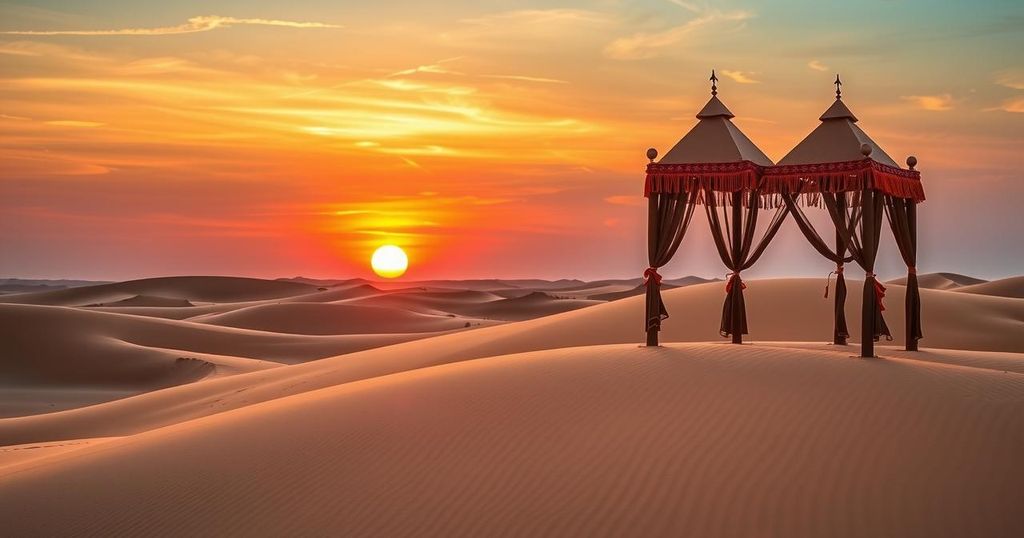Cars
ABU DHABI, ANDRE AGASSI, ARABIAN PENNISULA, ASIA, BENTLEY, CITIZENSHIP, DUBAI, FEDERAL SUPREME COUNCIL, FEDERER, FORTUNE, FORTUNE MAGAZINE, HERITAGE, JAZZ, KHALILFA BIN ZAYED AL NAHYAN, MIDDLE EAST, NEW YORK CITY, PARTNERSHIP, ROGER FEDERER, ROLLS ROYCE, STRATEGIC PARTNERSHIPS, TIGER WOODS, UNITED ARAB EMIRATES, VISION 2030
Jamal Robinson
0 Comments
Transformational Journey of the United Arab Emirates: From Desert to Dynamism
This article explores the transformation of the United Arab Emirates from an underdeveloped region to a modern nation marked by impressive infrastructure and governance changes. Highlights include its unique socio-political structure, cultural evolution, and the role of women, alongside a focus on national and regional stability in a historically volatile context, particularly concerning relations with Iran and the United States.
The United Arab Emirates (UAE) has undergone remarkable transformation in the past forty years, evolving from a largely undeveloped region reliant on camels for transportation to a modern nation boasting superhighways, upscale malls, and luxury vehicles. The country presents a striking contrast to its historical roots, showcasing cutting-edge infrastructure amidst its desert environment. This brief exploration highlights the far more profound cultural, economic, and political aspects beyond the glitz.
The UAE, located along the Persian Gulf and part of the Arabian Peninsula, is composed of seven emirates, each governed by its ruler. Abu Dhabi, home to 90 percent of the nation’s oil reserves, is the capital and plays a central role in the federal administration, whereas Dubai represents the vibrant commercial heart of the country. Citizens enjoy various social benefits, including free healthcare, education, and tax exemptions.
Established after gaining independence from Britain in 1971, the UAE’s governance consists of absolute monarchs who form the Federal Supreme Council, overseeing legislative and executive powers. The ruler of Abu Dhabi currently serves as the president, while the vice president and prime minister hail from Dubai. With appointed and elected positions, the Federal National Council (FNC) has evolved to incorporate a more democratic approach to governance.
During a visit to the UAE, a group of American journalists met with notable Emirati leaders, including Najla Al Awadhi, who emphasized the need to dispel misconceptions about Muslim women. She advocated for a broader understanding of Muslim women’s experiences and highlighted the progress Emirati women have made in education and politics. She stated, “Muslims cannot be lumped into one basket.”
The culture of the UAE is rapidly evolving, with a notable increase in female university attendance, where women now outnumber men academically. The country collaborates with renowned international institutions to enhance educational opportunities, emphasizing quality over quantity. His Excellency Salah Al Shamsi remarked on the uniqueness of such collaborations, questioning where one might find entities like the Sorbonne or Johns Hopkins outside their home countries.
Despite the security concerns following the events of September 11, the UAE has prioritized developing its educational infrastructure, attracting students from across the region. Officials expressed that while many received education in the U.S., current geopolitical conditions complicate travel and safety perceptions. Minister Mohammed Hussain Al Sha’ali shed light on the U.S.’s perception issues globally, urging improved relations and dialogue.
The UAE’s strategic position in a volatile region compels it to foster stability and develop alternative economic pathways such as a Pan-Arab railway, lessening reliance on the vulnerable Strait of Hormuz. While maintaining cordial trade with Iran, the UAE is wary of its nuclear advancements. Al Sha’ali conveyed concerns about the evolving political landscape and urged the U.S. to reconsider its approach to Iraq and develop a more inclusive governance system in the region.
Discontent regarding U.S. intervention in the Middle East persists, with officials advocating for localized diplomatic solutions over military action. Al Sha’ali remarked on the necessity for the region’s countries to assume greater roles in managing their geopolitical realities, as alternative military approaches could exacerbate tensions and destabilize the global economy. This collective understanding reveals a regional demand for a reimagined diplomatic relationship with external powers, especially regarding nuclear negotiations with Iran.
The evolving nature of the UAE highlights a nation striving for growth, stability, and modernity in a challenging environment. While relationships with global powers remain vital, fostering regional cooperation and encouraging dialogue will prove essential in navigating the complexities of the contemporary Middle Eastern landscape.
The United Arab Emirates exemplifies transformation and adaptation, balancing rapid modernization with cultural evolution. As the nation confronts both internal and external challenges, its leaders emphasize the importance of dialogue and regional cooperation. The UAE seeks to maintain stability while navigating complex geopolitical dynamics, showcasing a commitment to education, equality, and responsible governance as fundamental principles in a rapidly changing world.
Original Source: www.newjerseyhills.com




Post Comment